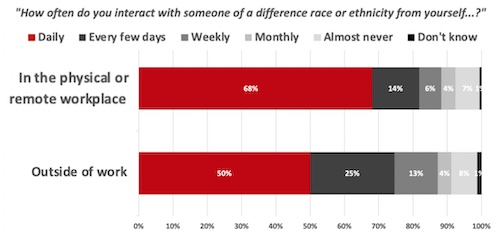 |
Workplaces are taking the lead in turning the US into a more pluralistic nation, according to a new study from Taft Communications and Rutgers University.
The State of Diversity public opinion survey, conducted by Taft and the Eagleton Center for Public Interest Polling at Rutgers, finds that almost seven in 10 employees (68 percent) say they come into contact with someone of a different race or ethnicity on a daily basis “in the physical or remote workplace.”
That compares to just 50 percent reporting that they come into contact with someone of a different race or ethnicity outside of work.
More than half (59 percent) of respondents said that they thought employers should make efforts to build a more inclusive workplace, with 56 percent saying that companies should also commit to increased efforts toward diverse hiring practices.
 |
Other steps recommended by those surveyed are making public statements (39 percent), making donations (38 percent) and publishing op-eds (37 percent).
When it comes to current practices from companies, 30 percent of respondents said the leadership at their workplace makes communications about the importance of diversity, equity & inclusion a “top priority,” while 35 percent say it is “somewhat of a priority.”
Almost half (47 percent) of the survey respondents said they have participated in some type of training or learning and development on DE&I in the past two years.
Feelings about the importance of diversity based on political affiliation or race vary considerably. Three-quarters (75 percent) of Black respondents said the issue was “very important” to them, while the number was 55 percent for Hispanic respondents and 48 percent for white respondents.
Comfort levels about addressing DEI issues at work seem to be rising, with 45 percent of respondents noting that they felt more comfortable talking about DEI with colleagues in the workplace than they did two years ago. Nearly as many (43 percent) said they also felt more comfortable discussing those issues with company leadership.
But offensive comments are still seen as a prevalent problem, with 45 percent of Black respondents and 39 percent of Hispanic respondents saying that they hear offensive comments about people of color at least “somewhat often.”
Equity in the promotion process also remains an issue, with 41 percent of Black respondents and 27 percent of Hispanic respondents saying they have felt passed over for a promotion due to their race. In addition, 34 percent of those under 35 and 25 percent of women felt similarly passed over.
“While there are many encouraging macro findings related to DEI in the workplace, the divide in perceptions by race, gender, politics, and sexual orientation are a distressing confirmation of the increased polarization we see in so many aspects of American society,” said Taft CEO Ted Deutsch.
The survey was conducted in January among 1,357 adults 18 or older living in the US.


 Employees at U.S. companies are experiencing high levels of burnout, but managers are lagging behind when it comes to their awareness of the problem
Employees at U.S. companies are experiencing high levels of burnout, but managers are lagging behind when it comes to their awareness of the problem Brand has a powerful effect on a company’s valuation, but the level of brand understanding in the investment community leaves a lot to be desired, according to a new study from Brodeur Partners, Interbrand and NewtonX.
Brand has a powerful effect on a company’s valuation, but the level of brand understanding in the investment community leaves a lot to be desired, according to a new study from Brodeur Partners, Interbrand and NewtonX. AI may still be viewed with a wary eye by most media pros, but its use is growing, according to a new study from Muck Rack.
AI may still be viewed with a wary eye by most media pros, but its use is growing, according to a new study from Muck Rack. A new study from Walker Sands says that some marketers have been putting the cart before the horse when it comes to the relationship between marketing channels and business outcomes.
A new study from Walker Sands says that some marketers have been putting the cart before the horse when it comes to the relationship between marketing channels and business outcomes. Thought leadership can make made B2B brands more "powerful and attractive to buyers," according to Edelman report.
Thought leadership can make made B2B brands more "powerful and attractive to buyers," according to Edelman report.


 Have a comment? Send it to
Have a comment? Send it to 
Mar. 17, 2022, by Joe Honick
As one of the very few who must have been polled or surveyed by anyone, something of this kind sparks interest. The data, at least those reported here, suggest whites are usually avoiding those of other racial backgrounds. Maybe it's true, but that would call for other in-depth discussions as to whether the "others" are avoiding Whites when it comes to significant contact. That also provokes discussion.
Somehow, in all studies, Whites come out as the racial pariahs, and maybe we are, even though we know many mixed racial wedding are taking place weekly and other combinations that suggest all sorts of folks do not let race get in their way.
There also is only isolated discussion of the fact major sports are almost 75% or more of one racial designation. I've always figured that the best qualified get on the court or the field and have to challenge for those spots....and those men and women seem to mix quite readily.
The point here is simply maybe we have too many surveys and polls that almost force respondents suddenly to become analysts of complex issues that had not given thought to before as teammates, dates or even marriage partners. But the published "results" that often compete with other similar surveys stir pots that boil over unnecessarily but provide publicity for survey operators.